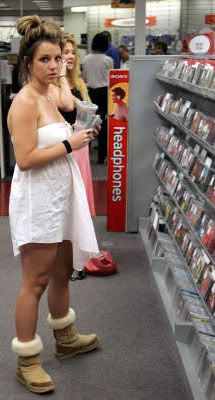Recently a
friend of mine posted a blog about a rather virulent
response he received to some earlier offhanded remarks on the
difference between opera and musical theater.
To wit, my friend had written "operas emerge from the tradition of classical music, while musicals emerge from the tradition of drama" and "Operas are pieces of vocal classical music to which a story is loosely set." The reader commented, "Everything you said...is wrong" and "Story is always first in opera with the music following from the situation and the characters."
As ill-informed as my blogger friend's stance might seem, he's more right than she is.
The question of whether story or music is more important has been a centuries-long debate, and the composer Richard Strauss actually wrote a full-length opera,
Capriccio, on the subject, in which the Countess has to decide between two suitors, a poet and a composer. She goes to bed without telling us her choice. But what is the difference between, say,
Götterdämmerung and
Chicago? (
Chicago will get you home before
The Golden Girls is on.)
Mankind has probably been using music to aid dramatic storytelling since we lived in caves, so the actual "origin" of opera is lost to the mists of ancient history. But what we call "opera," which is the Italian word for the Latin "opus," meaning "work," had its formal beginnings in Florence at the end of the 16th century. As with other artforms during the renaissance, there was a fascination with idealized visions of classical Greek and Roman culture.
There was a desire to present ancient Greek dramas in an "authentic" manner. Since research indicates that the great dramas of Euripides and Sophocles were at least partly sung or chanted, a group of scholars known as the
Florentine Camerata set about devising a way to provide music for them, and what they came up with resembles the
recitativo accompagnato of later composers like Händel. There were no long, beautiful arias, tuneful duets our rousing ensembles; it was just the text of the drama "set" in a rhythmic approximation of actual speech patterns, accompanied by a very small orchestra (harpsichord and a couple of string instruments).
So, no, in fact it is exactly
wrong to say that opera developed from a musical rather than dramatic tradition.
It is also exactly wrong to say that the story is always first. As European music grew more complex and opera grew in popularity, the demand for performances roughly mirrored today's audience for Hollywood blockbuster movies; the biggest stars could be counted on to show up and do what they do, and whether the story made sense or not was hardly a primary concern.
Most composers placed a high value on drama, but the demands of the market sometimes made high standards impossible. In-demand composers working on commission often had to churn out several operas a year: Donizetti wrote 70 operas between 1818 and 1843; Rossini wrote 40 before he retired at the age of 36 in 1828 and became a chef. To save time, composers often recycled good pieces from unsuccessful shows. Perhaps most famously, Rossini took his overture from
Elisabetta, Regina d'Inghilterra and stuck it on the front of
Il barbiere di Siviglia. If music "always" follows from the situation and the characters, I have a hard time seeing a relationship between Figaro's capers and Queen Elizabeth I.
And then there's Richard Wagner, who went from straightforward storytelling in
Der Fliegende Holländer and
Lohengrin to
Parsifal, where what "story" exists is merely a skeletal framework upon which to hang a deep philosophical treatise. Of course, Wagner didn't call
Parsifal an opera. It's a "Bühnenweihfestspiel."* (Gesundheit.)
But you know, if you're going to compare opera and musical theater, convincing, compelling drama isn't the standard to go by.
Dance of the Vampires, anyone?
So what
is the difference?
Mike's whole thing got started because our favorite intellectuals down at the
New York Post called
Caroline, Or Change an "opera" because it is through-sung. But that's hardly the criterion; by that standard,
Les Miserables is an opera while
Carmen, Fidelio, Die Fledermaus and
Die Zauberflöte are not because they have spoken dialogue. And then there's Stravinsky's
The Rake's Progress, which has no music.**
One might be tempted to argue that operatic music is more "sophisticated" or "complex," but having sung them I can tell you that Bernstein and Sondheim can be every bit as harmonically and rhythmically complex as Puccini. You could almost say that musical theater grew out of "popular" music as opposed to opera, except that, especially in the 19th century, opera
was popular music. In the days before Linda Ronstadt and Eminem, young ladies would entertain themselves at parties attempting to sing "Di tanti palpiti" and "Caro nome." (Actually, in New York City, you can still find parties like that...and it's not just the ladies singing "Caro nome.") Nineteenth-century opera tended to be nationalistic, and you'll find folk-music influences from Weber to Mascagni to Massenet.
It's not a fully satisfying answer, but I think the principle difference is the demand placed upon the singers. I say "not fully satisfying" because Purcell's Aeneas is a far easier sing than Elphaba, and the tenor tessitura in
Jesus Christ Superstar is right up there with
I Puritani. If you can sing "Glitter and be Gay," you can sing "Je veux vivre." But the fact is that high school girls across America can sing Maria or Eliza Doolittle just fine, but you don't see community theater productions of
Tristan und Isolde. (Thank God. The Vienna Opera meant to give the world premiere back in the 1860s, but gave up after
seventy rehearsals and deemed it "unperformable.") Evita might seem like a marathon, but it's no Brünnhilde.
Futhermore, the critical standard to which classical performers are held far outpaces that of Broadway stars. Leaving aside the deplorable state of acoustics on Broadway that rely totally on deafeningly amplified music, in terms of intonation, musical accuracy, diction, vocal health and idiomatic performance across a wide range of styles, being a professional opera singer requires abilities that make musical theater singers look like church choir ladies.
But that's comparing
Aidas to
Oklahomas.
*Stage Dedication Festival Play** That's a joke. I just don't like Stravinsky.



.jpg)















